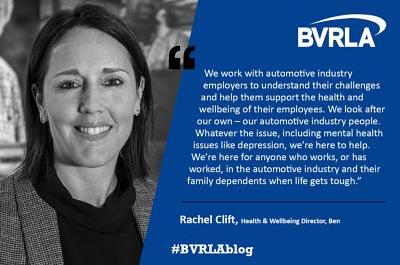Rachel Clift, Health & Wellbeing Director at Ben, the automotive industry charity that provides support for life through its free and confidential online self-help, helpline and support services, shines a light on depression and mental health and the help available.

An estimated 264 million people worldwide[1] are affected by depression and it’s one of the most common mental health issues faced by people in the UK. Depression can affect anyone at any time, with one in five people in the UK reporting feeling depressed or anxious[2].
From our own insights, we know that depression is one of the biggest issues facing those working in the automotive industry. Each year, we’re supporting more people with mental health issues, such as depression and anxiety. Mental health issues represented over 50% of our helpline enquiries last year.
We've also seen a rise in the number of people seeking help for low mood and depression, which isn’t surprising as it’s been reported that the number of adults experiencing depression has almost doubled since the start of the pandemic[3]. We’ve seen over 10,000 views of our managing depression web page since March 2020 and views of our depression landing page have increased by 17% from November 2020 - January 2021.
Depression is more than just the feeling of being unhappy or fed up. When someone is depressed, their low mood (and other related mental / physical symptoms) carry on persistently for weeks, months or even years with no let up. Episodes of depression can affect a person’s whole life and relationships and everyday tasks can become overwhelming.
Depression can cause a wide range of possible symptoms, both mental and physical. Each person’s experience is different but here are some possible signs of depression:
- Feelings of helplessness
- Persistent sad, pessimistic, or empty feelings
- Loss of interest in normal hobbies / activities
- Difficulty concentrating / making decisions
- Tiredness or lack of energy
- Sleeping difficulties
- Physical aches and headaches
- Suicidal thoughts.
With the right support, it’s possible to manage the symptoms of depression and make a full recovery. Lifestyle can also play a key role in recovering from and managing depression (both short and long term). Making positive lifestyle changes, such as being more active, improving sleep, eating well, staying hydrated, managing your weight and cutting down on alcohol can all have a significant impact on mental health and wellbeing. Some people may also benefit from talking therapies including Cognitive Behavioural Therapy (CBT) or counselling and, for some, prescribed medication.
We also work with automotive industry employers to understand their challenges and help them support the health and wellbeing of their employees.
We provide training to support mental health in the workplace, including our CPD accredited training, Managing Mental Health in the Workplace. In addition, we provide Mental Health First Aid training, offering employees tools to manage their own mental health as well as supporting colleagues.
We look after our own – our automotive industry people. Whatever the issue, including mental health issues like depression, we’re here to help. We’re here for anyone who works, or has worked, in the automotive industry and their family dependents when life gets tough.
We work with people to improve their lives by enhancing their health and wellbeing providing online self-help as well as through our free and confidential helpline and support services. If you or someone you know might benefit from Ben’s support, contact our free and confidential helpline: 08081 311 333.
Ben also now provides fast-track access to SilverCloud, our digital platform to help people better manage their mental health and wellbeing. There are a range of programmes available on the platform, including on topics such as depression and anxiety. SilverCloud is free for anyone who works, or has worked, in the automotive industry.
At the BVRLA's Annual Dinner 2020, members and guests raised £10,500, generously given to support Ben.
[1] https://www.who.int/news-room/fact-sheets/detail/mental-disorders
[3] https://www.ons.gov.uk/peoplepopulationandcommunity/wellbeing/articles/coronavirusanddepressioninadultsgreatbritain/june2020




